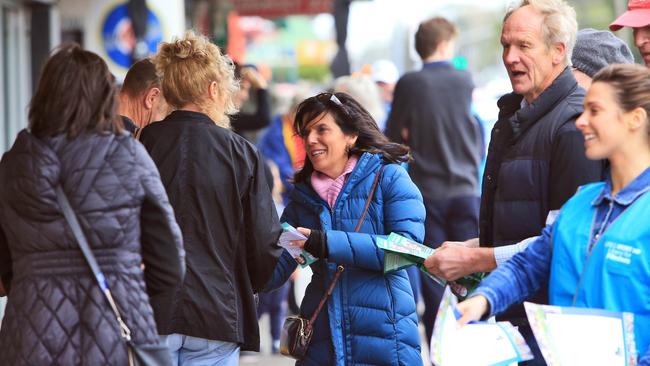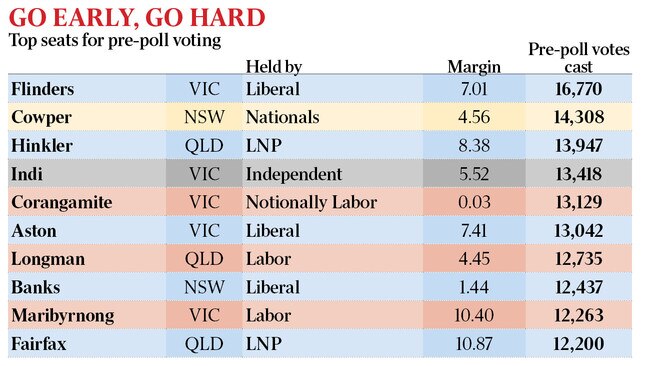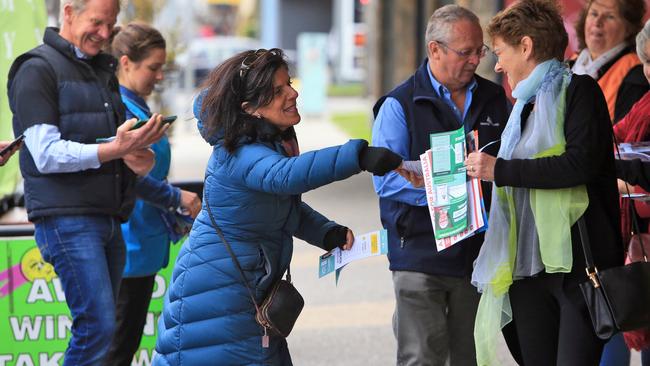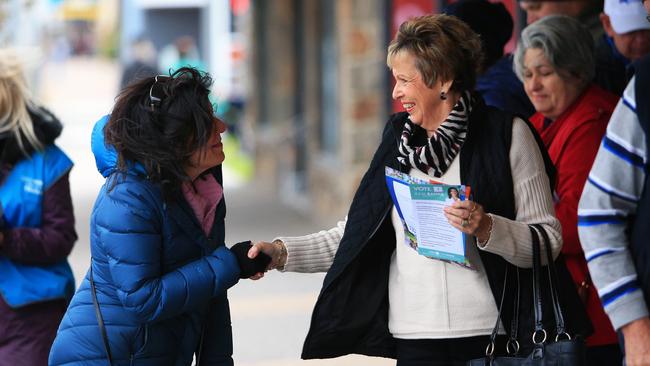Parties concerned by earlybird voting
More than 1.4m people have already voted | Which seats are being swamped by earlybirds?

Five of the nine seats with the highest turnout of early voters are in Victoria, a state that has been widely billed as holding the key to the election result.
Approximately 1.4 million people had cast their vote as of yesterday, according to the Australian Electoral Commission, leading both major parties to raise concerns about the length of time between the start of pre-poll voting and election day.
Voters in the Mornington Peninsula seat of Flinders are leading the charge on early voting, with more than 16,700 people casting their vote between April 29 and Tuesday.
Greg Hunt holds the seat on a margin of just over 7 per cent, but faces tough competition from former Liberal Julia Banks, who is receiving support from lobby group GetUp and the new climate collective of 14 fellow independent candidates.
Mr Hunt spend Wednesday afternoon at opposite ends of the early voting centres in the seaside town of Rosebud to Ms Banks, both braving the cold as they attempted to woo voters.
Outside the early voting centre, Noelene Harvey told The Australian she gave her early vote to Labor’s candidate, Josh Sinclair.
Ms Harvey said she decided to vote early in Rosebud because her mind was made up. “I think since we’ve had the third leaders debate, anything I would have heard which might have been able to sway me didn’t come to fruition,” she said. “There was no point in waiting. I’m ready for the change.”

The NSW north coast seat of Cowper has the second-highest early voter turnout, with more than 14,300 people lodging their vote so far in the contest between independent Rob Oakeshott and the Nationals’ Pat Conaghan.
There have been more than 13,100 votes cast in Liberal Sarah Henderson’s ultra-marginal Victorian coastal seat of Corangamite, which the Liberals hold by 0.03 per cent.
In Labor leader Bill Shorten’s Melbourne seat of Maribyrnong, 12,263 people have already voted.
Indi, the northeast Victoria seat recently vacated by independent Cathy McGowan, which the Liberals hope to pick up, and Liberal Alan Tudge’s outer-Melbourne seat of Aston have also seen large pre-poll numbers.
Both major parties have criticised the long pre-poll period and fear that Australians’ enthusiastic uptake of early voting could change the traditional election campaign in unexpected ways, especially the rapidly moving political climate and news cycle.


“That needs to be looked at,” Labor frontbencher Anthony Albanese told Sky News. “Pre-poll voting is very valuable but three weeks is a long time.”
Josh Frydenberg agreed that it “does feel a bit long. That’s an issue that will probably be revisited … after this election.”
A Liberal campaigner said candidates were now spending the last three weeks of the five-week campaign at pre-polling stations instead of out in their communities. He said a longer pre-poll period meant parties might be expected to announce more big policies earlier in the campaign, which could be forgotten come election day.
"Members want to get around their electorates," the Treasurer said. "Some members holding portfolio responsibilities either in government or shadow portfolio responsibilities would like to get around other parts of the country."
At least another four million people, totalling a third of the 16.4 million Australians on the electoral roll, are expected to cast their votes before May 18. The AEC has promised the record number of pre-poll votes will be counted on the night and won’t delay a result.



To join the conversation, please log in. Don't have an account? Register
Join the conversation, you are commenting as Logout